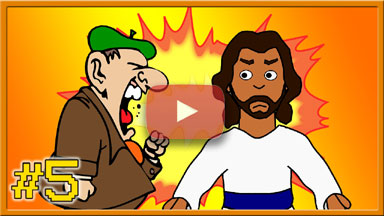Site last updated on February 22nd, 2026.
Site last updated on February 22nd, 2026.
Click on the quote below to read the article...

"A live-by-faith, work-for-God-not-money Christian community. We distribute Bible-based comics, videos, CDs, novels, and other tracts, and do free (voluntary) work. We are against hypocrisy and self-righteousness in the church; and we are in favour of honesty, humility and love."
- Details

Christian tradition has tended to exaggerate the distinction between the Son of God and God's Holy Spirit.
When Jesus was baptised by John, the Bible says the Holy Spirit came down on him in a bodily form, like a dove. (Luke 3:22) It further says that God did not just give a "measure" of the Holy Spirit to Jesus (as he does to each of us), but rather that Jesus had the "fullness" of God's Spirit. (John 3:34)
We understand this to mean that there was no division between Jesus' own spirit and God's Spirit (like there is with us). His spirit and God's Spirit were one and the same.
So the Holy Spirit was not invented on the Day of Pentecost. The disciples had been touched by the Holy Spirit throughout their time with Jesus. Receiving the Holy Spirit and receiving the spirit of Jesus are pretty much the same thing.
So what is the link between the spirit of Christ and what happened on the Day of Pentecost, i.e. on the day when the disciples were said to be "filled" with the Holy Spirit?
A clue can be found in John 6:63, where Jesus said, "The words that I speak to you are Spirit and they are life." Or as the Today's English Version puts it: "The words that I have spoken to you bring God's life-giving Spirit." In another place Jesus said that the Holy Spirit would bring his teachings to our remembrance. (John 14:26) So the teachings bring the Spirit and the Spirit brings the teachings. They are intricately interlinked.
The Day of Pentecost was the climax of 3 1/2 years of soaking in the teachings of Jesus. The disciples, and most of Jerusalem, had been saturated with his teachings. The religious hierarchy had, in fact, heard enough of what Jesus taught to make them kill him just to try and shut him up. At Pentecost the "body" of Jesus was gone, but his followers moved on in the power of his "spirit".
Peter says that we are "born again" by the Word of God. (1 Peter 1:23) John 1:11-12 says that we receive power to become God's children only by receiving Jesus in a way that his own people did not receive him. His "own people" had no problem with Jesus the miracle worker, as long as he kept his mouth shut; but they could not accept his teachings. And the situation is not much different today.
If the church insists on preaching religious experiences without giving people the teachings of Jesus, then you can be sure that the experiences that they offer will be a counterfeit. Only the words that Jesus spoke can bring God's life-giving Spirit. It was the teachings of Jesus which precipitated Pentecost.
We have found that those who start with the assumption that the Holy Spirit is something quite separate from Jesus (i.e. primarily an "experience") are amongst the strongest opponents of his teachings. They generate doctrines which make Jesus the Teacher the enemy of God the Holy Spirit. And yet Jesus said that the Holy Spirit would "bring to your remembrance all things whatsoever I have said unto you." (John 14:26)
If your faith is in an experience, you will end up denying the words of Jesus. If your faith is in the words of Jesus, you will still receive experiences (when and as God chooses), but with or without the experiences, you will have God's true Holy Spirit... and that is what really matters.
Experiences are subjective, and they must therefore be subject to the teachings of Jesus, which should be our true (objective) source of guidance.
Jesus breathed on the disciples sometime before the Day of Pentecost, and he said, "Receive the Holy Spirit!" (John 20:22) But even before that, they were receiving his spirit, inasmuch as they were receiving his teachings. Even if we did not have verses like John 6:63 to tell us this, common sense should tell us. It is impossible to know the "spirit" of a person without reference to what that person has said.
The word "spirit" means "breath". Breath and words both come from the mouth. You cannot speak without breathing. In Revelation 19:13-15, Jesus is called the "Word of God" and a sword comes out of his mouth. In Ephesians 6:17 this is called "the sword of the Spirit". Jesus, the Spirit of God, the Word of God and the teachings of Jesus are all interchangeable.
You find the spirit of a law by studying the words, in an effort to grasp the essence of what they are communicating. Sure, people can distort the law by focusing on one "letter" over another. But it does not mean that we should not try to grasp the "spirit" of the law, by looking for the "sincere milk of the word". (1 Peter 2:2) And you will find the true Spirit of Christ by studying his teachings. Jesus himself said that out of the abundance of the heart the mouth speaks. (Matthew 12:34) In other words, the spirit (or heart) that is in us will come out through what we say. The Spirit of Christ also came out through what he said.
If you wanted someone to get the spirit of what you were saying, wouldn't you rather have them humbly listen to you than to have them go off in a room and tickle themselves with a feather while saying your name, in an attempt to obtain an experience?
Obviously, the essence of what you are (your personality, your authority, your credibility, your spirit, or whatever you want to call it) could best be discovered by listening to what you say.
Your flesh proves nothing; it is your spirit that is important, and the words that you speak are your spirit. The same is true of Jesus. (John 6:63) Or, if you prefer the TEV translation, the words that anyone speaks will bring their spirit to those who listen.
There are a lot of "unclean spirits", but only one Holy Spirit, and that Holy Spirit is the spirit of Christ the Teacher--the second Person of the Trinity. Receive his teachings and you'll receive his Spirit. Reject his teachings and you'll receive an unclean spirit.
(See also The Spirit Of Prophecy and The Word of God.)
Register or log in to take the quiz for this article




















